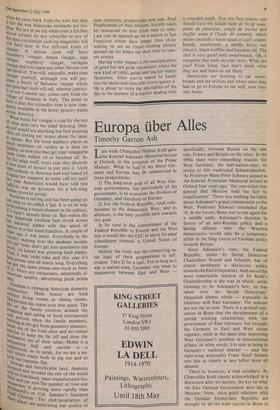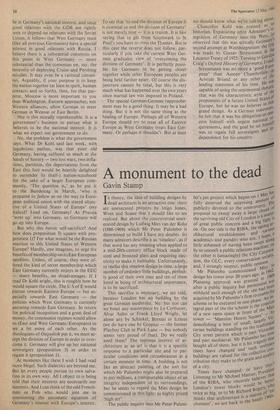Europa iiber Alles
Timothy Garton Ash
Liast week Chancellor Helmut Kohl gave the Konrad Adenauer Memorial lecture at Oxford, in the presence of the Prime Minister. What he had to say about Ger- many and Europe may be summarised in three propositions:
1) The long-term goal of all West Ger- man governments, but particularly of his government, is to overcome the division of Germany, and therefore of Europe. 2) For the Federal Republic, total com- mitment to the democratic West, and its alliances, is the only possible path towards this goal.
3) So total is the commitment of the Federal Republic to Europe and the West that it would like the EEC to move forward schnellstens towards a United States of Europe. Neither the truth nor the connecting in- ner logic of these propositions is self- evident. Take 2) for a start. For so long as it was a nation-state, Germany was wont to manoeuvre between East and West — specifically, between Russia on the one side, France and Britain on the other. In the 1950s there were compelling reasons for West Germany, the half-nation-state, to return to this traditional Schaukelpolitik. As Professor Hans-Peter Schwarz argued in the Konrad Ardenauer Memorial lecture at
Oxford four years ago, 'the conviction was general that Moscow held the key to reunification'. There was nothing ineviable about Adenauer's grand commitment to the West. Professor Schwarz concluded that 'if, in the future, Bonn was to opt again for a middle path, Adenauer's decision in favour of an anti-Russian policy and a lasting alliance with the Western democracies would only be a temporary affair in the long course of German policy towards Russia.'
Since Adenauer's time, the Federal Republic, under its Social Democrat Chancellors Brandt and Schmidt, has of course developed a distinctive policy towards the East (Ostpolitik). And one of the more remarkable features of Dr Kohl's Chancellorship is the way in which, while claiming to be Adenauer's heir, he has taken over the Social Democrats' Ostpolitik almost whole — especially in relations with East Germany. The reasons are not far to seek. There is a general con- sensus in Bonn that the development of a special working relationship with the government of East Germany has brought the Germans in East and West closer together, while at the same time improving West Germany's position in international affairs. In other words, it is seen as being in Germany's national interest — and the right-wing nationalist Franz Jozef Strauss sees this as clearly as any, leftist lover of detente.
There is, however, a vital corollary. As Chancellor Kohl clearly acknowledged in a discussion after his lecture, the key to what the East German Government does lies in Moscow. Now, since good relations with the German Democratic Republic are thought by all the main parties in Bonn to
be in Germany's national interest, and since good relations with the GDR are rightly seen to depend on relations with the Soviet Union, it follows that West Germany must (like all previous Germanies) have a special interest in good relations with Russia. 1 believe there is a substantial consensus on this point in West Germany — more substantial than the consensus on, say, the necessity of deploying Cruise and Pershing missiles. It may even be a rational consen- sus. Arguably, if your purpose is to keep the nation together (at least in spirit, human contacts and so forth), then, for that pur- pose, Moscow is more important to you than Washington. Eastern approaches, not Western alliances, allow German to meet German in Weimar or East Berlin.
Nor is this morally reprehensible. It is a government's business to pursue what it believes to be the national interest. It is what we expect our government to do.
No, the problem is what the government says. What Dr Kohl said last week, with lugubrious pathos, was that poor old Germany, having suffered so much at the hands of history — two lost wars, two infla- tions, partition, the deportations from the East (his list) would be heartily delighted to surrender its (half-) nation-statehood for the sake of a larger European com- munity. 'The question is,' as he put it to the Bundestag in March, 'who is prepared to follow us on the way to Euro- pean political union with the stated objec- tive of a United States of Europe' (my italics)? Lead on, Germany! As Prussia `went up' into Germany, so Germany will go up into Europe.
But why this heroic self-sacrifice? And how does proposition 3) square with pro- position 1)? For what would be the Russian reaction to this United States of Western Europe? Hardly, one imagines, to urge the benefits of membership on its East European satellites. Unless, of course, they were of- fered the kind of secret membership which East Germany currently enjoys in the EEC — many benefits, no disadvantages. If I read Dr Kohl aright, this is roughly how he would square the circle. The U S of E would pursue towards Eastern Europe — but es- pecially towards East Germany — the policies which West Germany is currently pursuing towards East Germany. In return for political recognition and a great deal of money, the communist regimes would allow us (East and West Germans/Europeans) to see a bit more of each other. As the theologians of Ostpolitik put it, we must ac- cept the division of Europe in order to over- come it. Germany will give up her national sovereignty (proposition 3) in order to regain it (proposition 1).
At moments like these I wish I had read more Hegel. Such dialectics are beyond me. But let every people pursue its own salva- tion in its own way. All I object to is being told that their interests are necessarily our interests. And I can think of the odd French- man or Pole who would join me in questioning the automatic equation of Germany's interest with Europe's interest. To say that 'to end the division of Europe it is essential to end the division of Germany' is not merely true — it is a truism. It is like saying that to get from Southwark to St Paul's you have to cross the Thames. But in this case the reverse ,does not follow, par- ticularly if you take the current West Ger- man gradualist view of 'overcoming the division of Germany'. It is perfectly possi- ble for Germans to be getting closer together while other European peoples are being held farther apart. Of course the dis- juncture cannot be total, but this is very much what has happened over the two years since martial law was imposed in Poland.
The special German-German rapproche- ment may be a good thing. It may be a bad thing. But it is not the same thing as the healing of Europe. Perhaps all of Western Europe should try to treat all of Eastern Europe as West Germany treats East Ger- many. Or perhaps it shouldn't. But at least
we should know what we're talking about. Chancellor Kohl was trained as an
historian. Expatiating upon Adenauer's in"
tegration of Germany into the West, he
observed that this was actually Germany's second attempt at Westintegration: the first
was made by Gustav Stresernann in the
Locarno Treaty of 1925. Turning to Gordo°
Craig's Oxford History of Germany, I read: Stresemann was no more a 'good Euro- pean' than Austen Chamberlain or Aristide Briand or any other of the leading statesmen of his time. He vIrs capable of using the sentimental rhetoric that was the characteristic style of the proponents of a future United States °t Europe, but he was no believer in grand design. As a German statesma he felt that it was his obligation to cern himself with urgent national
$
quirements, and the goal Ile set him in- dependence to regain full sovereignty and I dependence for his country.







































 Previous page
Previous page